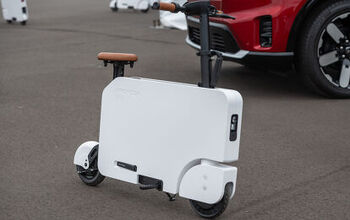Fiat Chrysler to Workers: We'll Decide When Our Plants Shut Down, Thank You

Despite new health measures incorporating physical distancing, barriers, and personal protective equipment, working on a factory floor is undoubtedly a tense experience for many these days. That certainly seems to be the case at Fiat Chrysler, which issued a warning to its hourly workers over the weekend.
As reported by Bloomberg, the warning comes after production stopped at two U.S. assembly plants amid workers’ fear of a lurking virus. Do that again, and expect a smaller paycheck, FCA replied.
The two unplanned work stoppages occurred at some point last week and on June 27th at FCA’s Jefferson North plant, home of the Jeep Grand Cherokee and Dodge Durango, and Sterling Heights Assembly, manufacturing base for the Ram 1500.
In the former scenario, plant workers refused to continue working after suspecting a coworker was ill with COVID-19; according to Bloomberg, that employee later tested negative. In the latter incident, staff rebelled after claiming their work stations weren’t sufficiently disinfected after another worker left the facility for a coronavirus test.
This kind of thing was bound to crop up, and workers’ concerns for their own health is something employers should never ignore. If you’ve never fully trusted your employer, you’ve likely never worked (that, or you’re a naive political flack).
In response to the temporary stoppages, Mike Resha, Fiat Chrysler’s head of North American manufacturing, wrote in a June 28th letter, “Unauthorized work stoppages in our facilities create both disruption, and, potentially, safety concerns, and therefore cannot be tolerated,” adding that unplanned production shutdowns “will result in zero pay.”
From Bloomberg:
A representative for Fiat Chrysler declined to comment on the letter. The company agreed to tighten health screening procedures for workers entering plants and dispatch cleaners to work areas within 15 minutes of being notified, Resha wrote. He also warned any employee who is untruthful in health-screening questionnaires that staff are required to fill out before entering facilities will be fired.
Given the prevalence and virulence of the virus, no health protocol that allows a business to stay in operation is going to be perfect. That said, no protocol is beyond reproach; better is always possible. Given that automakers are struggling to churn out trucks and SUVs after nearly two months of cash-burning, revenue-slashing lockdown, plant workers aren’t without leverage. Both workers and their employers have the other over a barrel, though the latter party has deeper pockets.
Earlier this week, General Motors rejected a request from a UAW local to temporarily halt SUV production at the automaker’s Arlington assembly plant amid a regional rise in coronavirus infections. Advantage: GM. Rewind the clock a handful of months, however, and GM was facing a 6-week walkout. Advantage: worker.
[Image: Matthew Guy/TTAC]

More by Steph Willems
Latest Car Reviews
Read moreLatest Product Reviews
Read moreRecent Comments
- MaintenanceCosts Nobody here seems to acknowledge that there are multiple use cases for cars.Some people spend all their time driving all over the country and need every mile and minute of time savings. ICE cars are better for them right now.Some people only drive locally and fly when they travel. For them, there's probably a range number that works, and they don't really need more. For the uses for which we use our EV, that would be around 150 miles. The other thing about a low range requirement is it can make 120V charging viable. If you don't drive more than an average of about 40 miles/day, you can probably get enough electrons through a wall outlet. We spent over two years charging our Bolt only through 120V, while our house was getting rebuilt, and never had an issue.Those are extremes. There are all sorts of use cases in between, which probably represent the majority of drivers. For some users, what's needed is more range. But I think for most users, what's needed is better charging. Retrofit apartment garages like Tim's with 240V outlets at every spot. Install more L3 chargers in supermarket parking lots and alongside gas stations. Make chargers that work like Tesla Superchargers as ubiquitous as gas stations, and EV charging will not be an issue for most users.
- MaintenanceCosts I don't have an opinion on whether any one plant unionizing is the right answer, but the employees sure need to have the right to organize. Unions or the credible threat of unionization are the only thing, history has proven, that can keep employers honest. Without it, we've seen over and over, the employers have complete power over the workers and feel free to exploit the workers however they see fit. (And don't tell me "oh, the workers can just leave" - in an oligopolistic industry, working conditions quickly converge, and there's not another employer right around the corner.)
- Kjhkjlhkjhkljh kljhjkhjklhkjh [h3]Wake me up when it is a 1989 635Csi with a M88/3[/h3]
- BrandX "I can charge using the 240V outlets, sure, but it’s slow."No it's not. That's what all home chargers use - 240V.
- Jalop1991 does the odometer represent itself in an analog fashion? Will the numbers roll slowly and stop wherever, or do they just blink to the next number like any old boring modern car?































Comments
Join the conversation
Good for FCA. Just because you want a day off doesn’t mean the company has to go along with it. Go to work, wear your silly little mask if you’re that fragile and do your job. It’s not that hard.
No its the customers who decide when to shut down FCA plants when they stop buying poor quality Fiat products.